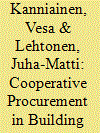|
|
|
Sort Order |
|
|
|
Items / Page
|
|
|
|
|
|
|
| Srl | Item |
| 1 |
ID:
171010


|
|
|
|
|
| Summary/Abstract |
The economic benefits of cooperative procurement derive from, at minimum, increased bargaining power relative to contractors and from economies of scale in production. There is, however, a puzzle: why is this kind of procurement so rare? This paper introduces a bargaining model with forward-looking expectations about the scale of procurement. It is shown that the price sensitivity of the scale of acquisition is favourable for the buying partnership, as it tends to push down the bargaining price. We propose several explanations for why it is hard to align buyers’ incentives: First, preferences for the properties of the products are country-specific, with divergent implications for national security. Second, countries that place a low value on the product have more bargaining power than those that value it highly, and may require a side payment in order to enter a partnership, while the partner may not have sufficient incentives to make such a payment. Third, the gains from cooperative procurement for the producer may not be sufficient to compensate for conflicting preferences among contractors. Fourth, while the future unpredictability of technologies or the future risks of deteriorating national security might support longer-term cooperative procurement, short-term opportunism tends to prevent long-term commitments.
|
|
|
|
|
|
|
|
|
|
|
|
|
|
|
|
| 2 |
ID:
164521


|
|
|
|
|
| Summary/Abstract |
A dynamic multi-stage decision-theoretic approach is introduced to establish the optimal offset and its incidence, the contract price arising from bargaining, and the scale of the acquisition. A new rationale is suggested for offsets in terms of their role as an insurance devise. Results are derived for the pricing of delivery contracts subject to offset claims and their national security implications. It is shown that the national security is strictly convex in the offset transaction. As to the incidence of the offset, the offset claim is shown to be capitalised in the delivery price. The bargaining price is shown to depend on the value of the product to be delivered for the national security, the relative negotiation power of the contracting partners and the social cost of public funds. The analysis highlights the expectation effects of offsets on the bargaining price and the scale of delivery. The results aid in explaining why offsets are widely used in procurement contracts for defence materiel. As they contribute to the national security, they should be allowed to survive and not be denied under competition laws.
|
|
|
|
|
|
|
|
|
|
|
|
|
|
|
|
| 3 |
ID:
158442


|
|
|
|
|
| Summary/Abstract |
The earlier work on the optimal design of the national security has focused on the opportunity cost of the draft in terms of foregone human capital formation. The current paper introduces the national security into the welfare analysis missing from the earlier work. This creates a trade-off between the private goods and the security as a public good in the social cost–benefit analysis. There are three major results. First, and arising from the intergenerational interaction, it is optimal to introduce a pay to the young generation when in duty even by resorting to a distortive tax. Second, when optimizing the size of the army, the optimal choice between the draft army and the professional army depends on the risk class of the country. A security gradient arises. Third, the choice is linked to the size and the quality of the reserve generated by the two approaches.
|
|
|
|
|
|
|
|
|
|
|
|
|
|
|
|
|
|
|
|
|